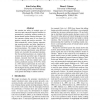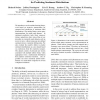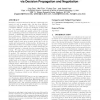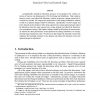335 search results - page 5 / 67 » Supervised Link Prediction Using Multiple Sources |
127
click to vote
NAACL
2004
15 years 3 months ago
2004
We examine the utility of multiple types of turn-level and contextual linguistic features for automatically predicting student emotions in human-human spoken tutoring dialogues. W...
194
Voted
EMNLP
2011
14 years 1 months ago
2011
We introduce a novel machine learning framework based on recursive autoencoders for sentence-level prediction of sentiment label distributions. Our method learns vector space repr...
141
Voted
KDD
2009
ACM
16 years 2 months ago
2009
ACM
Nowadays, enormous amounts of data are continuously generated not only in massive scale, but also from different, sometimes conflicting, views. Therefore, it is important to conso...
110
Voted
DIS
2009
Springer
15 years 8 months ago
2009
Springer
Multiple-instance learning (MIL) is a generalization of the supervised learning problem where each training observation is a labeled bag of unlabeled instances. Several supervised ...
102
Voted
DCC
2005
IEEE
16 years 1 months ago
2005
IEEE
Asymptotically optimal bit allocation among a set of quantizers for a finite collection of sources was determined in 1963 by Huang and Schultheiss. Their solution, however, gives ...




